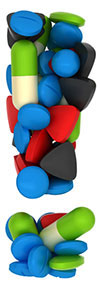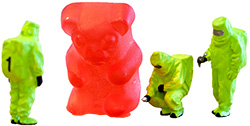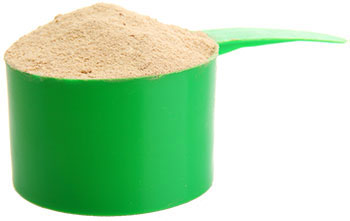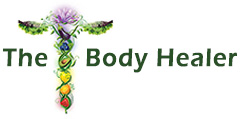Are Your Supplements Synthetic?

According to the multi-billion dollar supplement manufacturers, it is a wonder we can survive without chugging down daily supplements. But the reality is that most of these supplements are made using synthetic lab-made chemicals that are health-depleting substances.
Synthetic supplements are no joke and should never be taken indiscriminately. Millions of people simply walk into a supplement store (or supplement section of the supermarket), choose a popular brand, and pop a pill or two every day having absolutely no idea what the ingredients in the supplements are doing to their body. They are genuinely unaware of the true biological impact these ingredients have on their body, and that many common vitamins and nutrients in supplements have been conclusively proven in multiple studies to harm the body.
|
Most of us have fallen prey to supplement hype and false advertising. Athletes, trainers, and people looking to lose weight are the most vulnerable to supplement fads. Athletes especially stack up on vitamins, minerals, amino acids, plant extracts, mass amounts of protein, and other special products that have little to no independent 3rd. party studies backing up the manufacturers claims.
Some studies directly link large quantities of these supplements taken over time to serious health conditions, such as osteoporosis and cancer. To add insult to injury, some are very expensive.
you are volunteering to be a chemistry experiment
Let's talk about the important difference between synthetic supplements and supplements with nutrients derived from whole foods. We'll also talk about why you should completely avoid common synthetic supplements such as folic acid and about the big protein myth when it comes to protein powders.
Synthetic vs. Natural
Common nutrients such as vitamin A, vitamin C, vitamin E, and folate all play a role in the functioning of a healthy immune system, but not when taken as an isolated synthetic nutrient and in high doses over extended periods of time. Not only do they provide no real benefit, but they also become toxic to the body.
- The body recognizes the difference between natural and synthetic supplements, and does not treat them both as the same thing. This means they will not be digested and assimilated the same way.
- When some nutrients are taken in isolation, they can adversely impact the body's ability to use other nutrients, and can also deplete other critical elements in the body. For example, excess iron can decrease zinc absorption (very important in human growth, and involved in many enzymatic processes).
Let's take a look at a few of the most common synthetic vitamins that are taken by millions of people each day that are not in the best interest of our health:
By looking at the supplement container ingredient list, we can see if the supplement is sourced from whole foods (e.g. hemp seeds, pea protein, fruits, vegetables, algae, microgreens...). If none are listed, then the supplement is likely synthetic.
Do You Really Need Supplements?
If you do, you're in the minority because most people don't. If your diet is healthy and your lifestyle choices are healthy ones, then the need for supplements becomes rare except when treating a diagnosed deficiency. Once that deficiency has been resolved, the supplement should then no longer needed. But if your diet is not healthy and some of your lifestyle choices are unhealthy ones (lack of exercise, addictions to caffeine or tobacco or other substances, etc.), then the answer is to fix the problem, not cover it up with pills.
There are few exceptions to this rule.
What Supplements are & when to use them...
Supplements & Children
 On a healthy, nutritious diet there should never be a need to feed supplements to children. This is a terrible habit that many parents follow due to the misguided advice of others (including pediatricians), or because they "assume" their children need it.
On a healthy, nutritious diet there should never be a need to feed supplements to children. This is a terrible habit that many parents follow due to the misguided advice of others (including pediatricians), or because they "assume" their children need it.
Most children's supplements are synthetically
created in a lab and have no place in a child's body.
Unless your child has a DIAGNOSED DEFICIENCY, walk away from synthetic nutrients and don't look back. If a deficiency is diagnosed, then purchase a supplement sourced from whole-food ingredients only until a retest shows the optimum level of the nutrient is restored and it no longer needs to be taken.
Healthy & natural foods for children..
Many traditional pediatricians recommend supplements for no other reason than they think it's a good idea, instead of instead recommending a diet rich in the real nutrients a child needs. Pediatricians are not nutritionists and unless they are naturopathic pediatricians, most traditional practitioners:
- Are unaware of the difference between healthy supplements and synthetic ones.
- Are unaware that most diseases & deficiencies are nutritionally preventable and controllable.
- Are unaware of the health dangers children are exposed to from eating foods containing pesticides, nor the link between pasteurized milk products and an increase in childhood allergies and infections.
Synthetic Supplements & China
 Many synthetic supplements are now manufactured in China, including over 90% of the US supply of vitamin C. Buying foods and supplements from China adds another layer of risk when it comes to our health.
Many synthetic supplements are now manufactured in China, including over 90% of the US supply of vitamin C. Buying foods and supplements from China adds another layer of risk when it comes to our health.
From E Coli and salmonella outbreaks, to pet food recalls causing the deaths and illness of thousands of household pets and livestock, to infant formula crises, it is clear that China has some very serious issues when it comes to quality control. In China, food safety is at its infancy and many foods made in China are made in small backyard operations that are dirty and infested with rodents and insects.
In 2011, more than half of food processing and packaging firms in China failed safety inspections according to a report by Asia Inspection, a China-based food quality control company who calls this figure "alarming." More disturbing is that rodent fecal contamination was responsible for around 10% of this figure.
There are many wonderful supplements that come from China, such as medicinal mushrooms and Chinese herbs used to treat various health conditions. If you use these supplements, look for verification that they have been tested by a 3rd. party independent organization for purity and safety.
The Lure of Protein Sports Supplements
Sports supplements are big business, and athletes are always looking for a way to achieve the edge with the "perfect supplement." Athletes who consume extremely large amounts of protein on a long-term basis set themselves up for tissue and organ damage, as well as chronic degenerative conditions in the future from the resulting metabolic acidosis.
The Protein Myth
 Protein may be an important component of exercise performance and recovery, but supplement manufacturers have capitalized on this by trying to convince us that much more is much better. Unfortunately, the exact opposite is true. Too much protein and amino acid supplementation can result in calcium loss, dehydration, digestive problems, and in more extreme cases, long term kidney and liver damage.(11)
Protein may be an important component of exercise performance and recovery, but supplement manufacturers have capitalized on this by trying to convince us that much more is much better. Unfortunately, the exact opposite is true. Too much protein and amino acid supplementation can result in calcium loss, dehydration, digestive problems, and in more extreme cases, long term kidney and liver damage.(11)
Many athletes consume far greater quantities of protein than their bodies need in the form of protein powders, believing it will increase muscle size and strength. There is significant evidence showing that protein in excess of 10-15% of the diet is not only unnecessary, but very unhealthy. The amount of food and calories an athlete needs may increase depending on activity level, but the ratio of protein should increase only slightly.
Not all protein sources are equal, and high quality plant protein (organic and non-refined) and animal protein (small quantities from pasture-raised animals, never factory-farmed) provide the necessary spectrum of amino acids to build protein. There should never be a need for additional supplementation in the form of powders.
Many plant foods are very high in amino acid content (amino acids are the building blocks of the protein needed by the body), and unlike meat, some contain most if not all of the essential amino acids needed by the body. Raw hemp protein, pea protein, and cranberry protein are very high in protein content, and are far less acid-forming and a much healthier choice than soy and whey. Hemp protein is also naturally high in chlorophyll content (hence the green color).
Always avoid the processed soy used in soy supplements If you haven't yet explored the sections on The Body Healer website on factory-farmed animal protein and processed soy, check it out:
The truth about animal protein from factory-farms...
Why the soy of today is NOT a healthy food...




